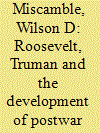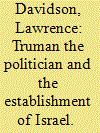| Srl | Item |
| 1 |
ID:
093969


|
|
|
|
|
| Publication |
2010.
|
| Summary/Abstract |
President Truman's de facto recognition of Israel on 14 May 1948 did not resolve the critical issues of de jure recognition, the new state's boundaries, the arms embargo, and financial assistance. In an ironic convergence with their frequent adversaries in the US State Department who often alleged that politics was driving Palestine policy, Israeli diplomats anticipated that favourable action from the Truman administration on these issues would be forthcoming in the course of that year's presidential election campaign. This article examines Israel's efforts to secure those objectives in the context of that year's presidential politics and the ongoing tug of war between White House and State Department. Despite persistent and determined advocacy, the mobilization of considerable support from American Zionists, and an apparently favourable political environment, Israel diplomacy was unable to overcome Truman's deference to State Department resistance to Israeli aspirations in the months leading up to his unexpected victory at the polls on 2 November 1948. It would be the success of Israeli arms, not the quest for Jewish votes, that proved to be the key to realizing the unfinished agenda of 14 May.
|
|
|
|
|
|
|
|
|
|
|
|
|
|
|
|
| 2 |
ID:
103840


|
|
|
|
|
| Publication |
2009.
|
| Summary/Abstract |
After its victory in World War II, it was clear that United States should move beyond the disastrous policies of the 1930s, but it was less clear how. Ultimately, a lasting postwar strategy was forged under President Truman. Appreciating how Truman moved well beyond Roosevelt's guiding assumptions is essential to understanding the evolution of American grand strategy. One sees that wartime planning and grand strategy formulation can prove quite inadequate for dealing with postwar challenges. An administration cannot be locked into assumptions, but must constantly test them. Thus, the Truman administration eventually developed and adopted containment and moved far beyond FDR's approach. More substantively, the fundamental geopolitical lesson of World War II and the early Cold War was that the United States must assume the essential balancing role relative to other major powers.
|
|
|
|
|
|
|
|
|
|
|
|
|
|
|
|
| 3 |
ID:
133476


|
|
|
|
|
| Publication |
2014.
|
| Summary/Abstract |
What is the origin of the norm that international institutions should support the economic development of poorer countries? It is commonly argued that the norm of international development was pioneered by US president Harry S. Truman in a famous 1949 speech as a means of serving US economic goals in the early Cold War. But this norm in fact emerged much earlier from Sun Yat-sen's thinking in China in 1918 and after that from Latin American preferences in the inter-American context of the 1930s. The latter were particularly influential in encouraging US officials to design, in the early 1940s, the first international institution with a strong development mandate: the International Bank for Reconstruction and Development. During the negotiations leading up to the 1944 Bretton Woods agreements, Latin American policymakers supported and reinforced the US plans, as did representatives of China, India, and Eastern Europe. For officials from these countries and regions, international development promised support for their increasingly ambitious domestic development goals while minimizing the costs that had often been associated with private international investments in the past.
|
|
|
|
|
|
|
|
|
|
|
|
|
|
|
|
| 4 |
ID:
099355


|
|
|
|
|
| Publication |
2010.
|
| Summary/Abstract |
Harry S. Truman was a temperamental and politically ambitious man. Both his sensitivities and ambition influenced his actions during his presidency. This was particularly the case when it came to Palestine because there existed a strong domestic Zionist lobby that played to Truman's wants and needs in order to influence his decision making. This article examines that process of policy formulation and shows how personality played into the president's behavior in ways that allowed the Zionist lobby to accomplish its ends. Though Truman's actions can be seen as a product of his personal sensitivities, his prioritizing of domestic political ambitions with regard to policy on Palestine set a harmful precedent for the future.
|
|
|
|
|
|
|
|
|
|
|
|
|
|
|
|